© HEAL Network for the Ethnography of Healing
Membership
HEAL Network for the Ethnography of Healing welcomes ethnographers in the field anthropology, sociology, religious studies, as well as medical professionals, therapists in the area of well-being, traditional and spiritual healers.
Contact us to join the network.
Members

Co-founder and coordinator of HEAL-Network for the Ethnography of Healing. Emily is Associate Professor in Anthropology at Sapienza University of Rome. PhD in Social Anthropology (University of Bristol), She has been visiting professor at the Universidade Federal de Santa Catarina, and Affiliate of the School of Anthropology and Museum Ethnography, University of Oxford. She has also been a Marie Skłodowska-Curie Fellow at Sapienza with the project THETRANCE investigating therapeutic uses of spiritual trance in a transnational perspective, She has conducted ethnographic research in the temples of the Vale do Amanhecer (Brazil and Europe), in Afro-Brazilian religions (Brazil), on Goddess Spirituality (UK and Italy), faith healing in the worship of Dr Sousa Martins (Portugal). She also explores the role of spirituality in doctor-patient
communication in end-of-life care. Author of Jaguars of the Dawn: Spirit Mediumship in the Brazilian Vale do Amanhecer (2020, Berghahn), co-editor of Other Worlds, Other bodies: Embodied Epistemologies and Ethnographies of Healing (2023, Berghahn). Co-editor with Elisabeth Hsu the Berghanhn Book series Epistemologies of Healing.
Research interests: spirit mediumship, possession and healing, embodied knowledge, religious experience and learning, body and self, emotions and senses, transnational religions, spirituality and biomedicine.
Research project: THETRANCE-Transnational Healing: Therapeutic Trajectories in Spiritual Trance
Contact: emily.pierini(at)gmail.com
Website: https://uniroma1.academia.edu/EmilyPierini
Emily Pierini
University of Rome Sapienza, Italy
Social Anthropologist
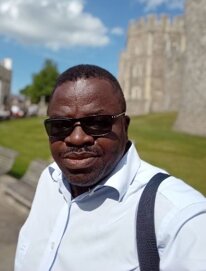
Action Amos is a person with a neurological disorder and the Regional Coordinator for International Bureau of Epilepsy- Africa with 28 affiliates in Africa. He is a Lived Experience Researcher. He is Technical Advisor for the Pan African Network for Persons with Psychosocial Disabilities (PANPDD). Currently he is a Researcher at University of Edinburgh. He hold an MSc in Mental Health in Children and Young People – University of Edinburgh, MBA in Leadership and Sustainability from University of Cumbria, a BA in Development Studies from Ireland and a Postgraduate Diploma in Disability and Rehabilitation Management from Cavendish University. Currently, he is a Postgraduate Research Fellow with the Clinical Brain Science Unit at the University of Edinburgh. Action is member of the International League Against Epilepsy (ILAE) Psychoeducation Task Force of the Psychiatry Commission.
He is also WHO Topic Expert Group (TEG) Member for the mental health gap (mhGAP) – Epilepsy Module and a WHO Taskforce on IGAP Implementation Toolkit Development. He is member of the International Consortium for Health Outcomes Measurement – Epilepsy Standard Outcomes Working Group Member. At Kenya Medical Institute of Research he is Advisor for the Epilepsy Pathway Innovation in Africa Project. Action has proven experience in the area of human rights, policy analysis, research and technical application. Currently, Action is a UN Spotlight Initiative as a Civil Society National Reference Group member in Malawi.
Research interests: Mental Health, Lived Experience, Social Inclusion, Engagement, Involvement.
Current project: Understanding Healthcare Decision-Making of Persons with Psychosis in Rural Malawi (Salima and Chiradzulu).
Contact: amos_action(at)yahoo.co.uk
Action Amos
University of Edinburgh
Pan African Network of Persons with Psychosocial DisabilitiesInternational Bureau of Epilepsy
Mental Health, Clinical Brain Science

Joana Bahia is Professor at State University of Rio de Janeiro. She holds a PhD in Social Anthropology (National Museum/Federal University of Rio de Janeiro, Brazil). Her research addresses transnational mediumship and religion in the public sphere. She has published extensively on Afro-Brazilian religions.
Research interests: Afro-Brazilian religions, transnational mediumship, religion in public sphere, spiritual trance, and religious intolerance.
Current projects: Rio de Janeiro under the eyes of Iemanjá. Offerings, Afro-religions parties and occupation of the city's public space. Ethnic food, transnational flows and identity and religion performances. Religious intolerance in Brazil.
Contact: joana.bahia(at)gmail.com
Website:
https://uerj.acad
emia.edu/JoanaBahia https://www.researchgate.net/profile/Joana_Bahia
Joana Bahia
State University of Rio de Janeiro, Brazil
Social Anthropologist

I am a faculty member at the Center for Religious Studies and Comparative Research, Adam Mickiewicz University in Poznań, Poland. I have been particularly interested in exorcism rituals characteristic of different religions. In 2021 I participated in the Exorcism and Prayer of Liberation Course that was organized by the Pontifical Athenaeum Regina Apostolorum of Rome in collaboration with the Group for Socio-Religious Research and Information (GRIS). My PhD thesis deals with the problem of how verbal strategies rooted in cognitive behavioral therapy (CBT) are being used in the contemporary Neo-Pentecostal communities based in Poland and Italy and how language may serve as a trigger, modulator, and mediator of one’s spiritual rebirth.
I have published extensively on Pentecostals and Pentecostal Catholics. I completed an internship at Sapienza University of Rome in 2022. Between 2019 and 2023 I was doing field research in both Poland and Italy.
Research interest: religious language, religious leadership, neuroscience of religious experience, religious rituals, cognitive behavioral therapy (CBT) in a religious context.
Current project: Verbal strategies and spiritual rebirth in Neo-Pentecostalism. Language as a trigger, modulator, and mediator of personal revival and transformation.
Contact: ewelina.berdowicz(at)amu.edu.pl; berdowicz.ewelina(at)gmail.com
Website: https://www.researchgate.net/profile/Ewelina-Berdowicz
Ewelina Berdowicz
Adam Mickiewicz University in Poznań, Poland
Religious Studies
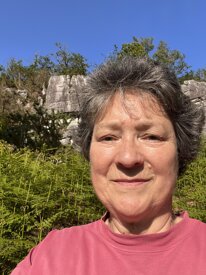
Fiona Bowie is a research affiliate in the School of Anthropology and Museum Ethnography at the University of Oxford, and a member of Wolfson College. She studied Anthropology at the Universities of Durham and Oxford. Fiona Bowie spent most of her teaching career in the Universities of Wales and Bristol. She has carried out fieldwork in Cameroon, West Africa, in Wales, and with the Bangwa diaspora in the USA and UK. Her writing covers a wide range of interests including religion, spirituality, gender (most recently trans identities), cognition and notions of the Afterlife, ethnographic methodologies and alternative healing. In 2010, together with some students and colleagues, Fiona started the Afterlife Research Centre as a network for scholars interested in exploring ethnographic methods
for the study of the Afterlife, Mediumship, Spirit Possession, and similar topics sometimes marginalised within mainstream academia. The HEAL -Network has expanded and considerably developed this initiative.
Research interests:
Religion, Spirituality, Afterlife, Ethnographic methodologies.
Current project:
Meditation and healing; processes of spiritual transformation.
Contact:
fbowie1(at)icloud.com
Website:
Fiona Bowie
School of Anthropology and Museum Ethnography, University of Oxford
Anthropologist of Religion
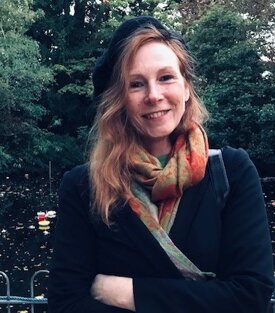
Paula Bronson is a Ph.D. researcher at University College London (UCL) in Social Anthropology. Her research field site was in a remote Tamang village in the Himalayan foothills of Nepal. A practicing pain specialist physiotherapist trained in the US, her doctoral research involved a clinical ethnography looking at villagers’ chronic pain coping and resilience in the aftermath of the 2015 earthquakes. This work introduced her to the traditional healing practices of the local shamans, Bompos, who have a central place in her work. She published a chapter called “Try Feeding the Ghost More” in Other Worlds, Other Bodies: Embodied Epistemologies and Ethnographies of Healing, edited by Emily Pierini, Alberto Groisman, & Diana Espirito Santo (2023, Berghahn.)
Research interest: Medical anthropology, shamanism, chronic pain
Contact: paula.bronson.10(at)ucl.ac.uk
Website: https://www.researchgate.net/profile/Paula-Bronson
Paula Bronson
University College London (UCL)Anthropology
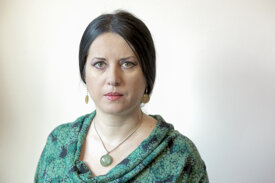
Daniela Calvo is PhD in Social Sciences at the State University of Rio de Janeiro (UERJ), Brazil and PhD in Mathematics at the University of Pisa, Italy. She is Member of the Research Group NUER – Nucleus of the Study of Religion of the Universidade do Estado do Rio de Janeiro, of CETRAB (Center for the Study of Afro-Brazilian Traditions), and member of the IUAES Commission on Pandemic. She has been conducting field research on African- derived religions in Brazil since 2011, and from 2020 also on Candomblé and Ifá in Italy, focusing on therapeutic rituals, human-nonhuman relationship, Covid-19 pandemic, sacred space, divination and destiny, gender relations. Other achievements of research deal with
Tarantism and Neo-Tarantism, the Cult of Maria Lionza, and the relation among witchcraft, politics and consumption in West Africa.
Research interests: Afro-Brazilian Religions; Health; Human-nonhuman Relationship; Tarantism; Cult of Maria Lionza
Current project: Human-nonhuman relationship and health in Afro- Brazilian Religions; harm and wellness in Candomblé; food and matrifocality in Candomblé; Afro-Brazilian religions and Covid-19 pandemic
Contact: dnlclv7(at)gmail.com
Website:https://independent.academia.edu/DanielaCalvo
Daniela Calvo
CETRAB (Center for the Study of Afro-Brazilian Traditions)
Social Sciences
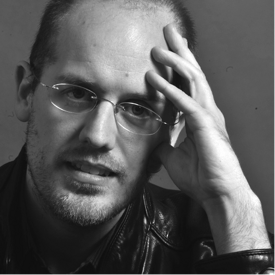
Roger canals is the advisor for the visual ethnography section of the HEAL Network. He works as associate professor at the University of Barcelona. Specialist in visual anthropology and Afro-American religions, he holds a Phd from the EHESS of Paris. Roger Canals has published numerous articles in journals like Visual Studies, L’Homme, Hau or Ethnos. He is also the author of the book A Goddess in Motion. Visual Creativity in the Cult of María Lionza (Berghahn Books, 2017). He has made several ethnographic films, internationally awarded, most of them on religiosity and visual culture. Some of his titles are: The Many Faces of a Venezuelan Goddess (2007), Bea wants to know (2010), A Goddess in Motion (2016) and Chasing Shadows (2019), made in collaboration with Ramon Sarró and Marina Temudo.
He has been Honorary staff member at the Granada Center for Visual Anthropology of the University of Manchester and visiting scholar at the University of Toronto and at the Institute of Caribbean Studies of Puerto Rico, among other institutions.
Research interests: Visual Anthropology, Afro-American Religions, Ethics, Ritual, Ethnographic Cinema.
Current project: ERC-Consolidator Grant. VISUAL TRUST
Contact: rocanals(at)gmail.com
Website: www.rogercanals.net
Roger Canals
University of Barcelona
Visual Anthropologist
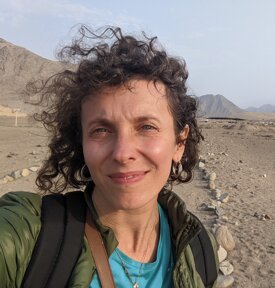
Giovanna is an Assistant Professor of Anthropology and Sociology at the State University of Rio de Janeiro (UERJ). She is trained as a social anthropologist with a particular interest in environmental anthropology, human-animal studies, historical ecology, and 'naturecultures'. During her PhD at the University of Roehampton, she conducted multi-sited fieldwork in Italy and Brazil looking at animal sacrificial practices and perception of the environment in Afro-Brazilian Candomblé, developing perspectives in the fields of anthropology of ritual, material culture and more-than-human ontologies. In 2019 she started a second fieldwork as a postdoctoral researcher within the TANDEM “Bewildering Boar” project (CEFRES/Charles University, Prague) focusing on human-wildlife conflicts in the Central Italy.
In 2020 she obtained a postdoctoral fellowship at the Musée du quai Branly, Paris, where she worked on the endings of ritual artifacts and offerings, ritual change, and environmentalist ethics in Afro-Brazilian religions. In 2021, she started a new project on cat-feeding practices at the University of Roehampton. She is currently working on the intersections between climate science, ritual, and religion in Brazil.
Research interests: Environmental Anthropology, Anthropology of Ritual, More-Than-Human Ontologies, Material Culture, Afro-Brazilian Religions
Current project: The Environmentalist Turn of Afro-Brazilian Religions
Contact: giovanna.capponi(at)gmail.com
Website: https://uerj.academia.edu/GiovannaCapponi
Giovanna Capponi
State University of Rio de Janeiro, Brazil
Social Anthropologist
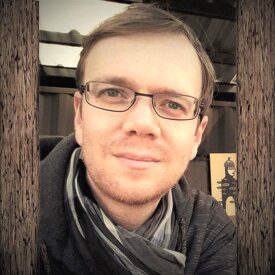
Graduated in Social Sciences at the Federal University of Rio de Janeiro, Master in Sociology and Anthropology and PhD in Human Sciences (Cultural Anthropology) by the Postgraduate Program in Sociology and Anthropology at the Federal University of Rio de Janeiro. Professor at the Federal University of Rio Grande (FURG) in the extreme south of Brazil. Researcher at the Center for Studies on Coastal Knowledge and the Interdisciplinary Center for Studies and Research on Yoga, both linked to the Federal University of Rio Grande.
Research interests: Ecological Epistemologies; Learning Process; Material Religion; Sensory Ethnography; Mind-Body-Environment Connection.
Current project: Steps towards a sacred perception of the environment
Contact: gustavorchiesa(at)gmail.com
Website: https://furg.academia.edu/chiesa
Gustavo Ruiz Chiesa
Federal University of Rio Grande, Brazil
Anthropologist
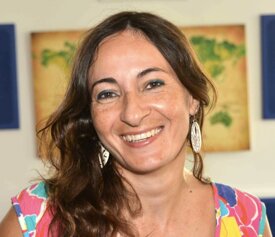
Dr. Erminia Colucci is Associate Professor in Visual and Cultural Psychology in the Department of Psychology at Middlesex University London (UK) and a registered Clinical and Community Psychologist (Italy). Her main area of research and training is in Cultural and Global Mental Health (PhD in Cultural Psychiatry), and Applied Cross-Cultural Psychology and Visual Anthropology (MPhil in Ethnographic Documentary), with a focus on low-middle income countries and immigrant and refugee populations. Erminia is passionate about using arts-based and visual methods in her research, teaching and advocacy activities. Erminia is the founder of Movie-ment and Chair of the World Association of Cultural Psychiatry SIG on Arts, Mental Health and Human Rights.
She has won several competitive grants including currently two ESRC/AHRC-GCRF projects: one as Principal Investigator - Using collaborative visual research methods to understand experiences of mental illness,
coercion and restraint in Ghana and Indonesia - and another as Co-Investigator - Mental health literacy in urban and rural communities in Kerala, India: An interdisciplinary approach using applied theatre methodology.
Research interests: Cultural Psychology/Psychiatry, Applied Visual Anthropology, Cultural and Global Mental Health, faith-based and traditional healing, spirituality and suicide.
Current project: Together for Mental Health: a visual research project on collaboration between faith-based and traditional healers and mental health professionals in Ghana and Indonesia [info and trailers https://movie-ment.org/together4mentalhealth/
Contact: e.colucci(at)mdx.ac.uk
Website: https://movie-ment.org/
https://www.mdx.ac.uk/about-us/our-people/staff-directory/profile/colucci-erminia
Erminia Colucci
Middlesex University London, UK Cultural Psychiatry
Visual Anthropology
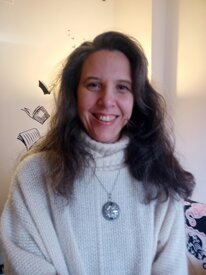
Dr. Francesca Conti is an adjunct professor and academic advisor at The American University of Rome, specializing in sociology, anthropology, and migration studies. She holds a PhD in Sociology from Sussex University, an MPhil from Cambridge University, and a BA in History & Social Anthropology from SOAS. She has published extensively on migration and identity. Her current research explores chronic illness narratives, resilience and body-mind-pain nexus. She is actively involved in the field of writing for well-being. As a counsellor, cancer survivor and woman living with chronic pain, she integrates her lived experience into her academic research, using auto-ethnography as both a scholarly tool and a healing practice.
Research interests: writing for well-being; chronic illnesses; resilience narratives; auto-ethnography; traditional medicines; meditation and trance; Body-mind-spirit.
Current projects: Self-absorption as the foundation for auto-induced trance; the role of gender and secrecy in folk medicine in Italy; time and acceptance in resilience narratives.
Contact: f.conti(at)aur.edu
francescaconti.uk(at)gmail.com
Website: https://aur.edu/news/aur-faculty-unplugged-professor-francesca-conti-international-relations-global-politics
Francesca Conti
The American University of Rome
Social Anthropologist

Thomas J. Csordas is a Distinguished Professor in the Department of Anthropology, the Dr. James Y. Chan Presidential Chair in Global Health, Founding Director of the Global Health Program, and Director of the Global Health Institute at the University of California, San Diego. Csordas has served as President of the Society for the Anthropology of Religion and Co-Editor of Ethos: Journal of the Society for Psychological Anthropology, and is an elected member of the American Society for the Study of Religion. He has conducted ethnographic fieldwork among Charismatic Catholics, Navajo Indians, adolescent psychiatric patients in New Mexico, Catholic exorcists in the United States and Italy, and providers of care for refugees and asylum seekers on the U.S./Mexico border. Critical topics in these studies include therapeutic process in religious healing, ritual language and
creativity, sensory imagery, self-transformation, techniques of the body, causal reasoning about illness, and the understanding of lived experience.
Research interests: medical and psychological anthropology, global mental health, anthropological theory, comparative religion, cultural phenomenology and embodiment, globalization and social change, and language and culture.
Current project: 'Hammering the Devil With Prayer', an ethnographic study of the 21st century resurgence of exorcism in the Roman Catholic Church. The work is a cross-cultural comparison of this ritual practice in Italy and the United States.
Contact: tcsordas(at)ucsd.edu
Website: https://anthropology.ucsd.edu/people/faculty/faculty-profiles/thomas-csordas.html
Thomas Csordas
University of California San Diego
Anthropologist

Dr. Yael Dansac is Anthropologist and Research Fellow at the Center for Interdisciplinary Studies of Religions and Secularism (CIERL) of the ULB, in Brussels. She obtained her PhD in Social Anthropology and Ethnology at École des Hautes Études en Sciences Sociales (EHESS) in Paris, with a thesis on embodied experiences and energy healing practices in French megalithic sites. She did her master (University of Guadalajara) and BA (ENAH) studies in Mexico, and analyzed alternative uses and meanings of archeological heritage in Latin America. As recipient of a CIVIS3i-Marie Curie Postdoctoral Fellowship (2022-2024), she conducted a comparative ethnography on nature-based spiritual practices and identity movements in Wallonia and Scotland, and was visiting researcher at University of Glasgow (2023).
She has presented research papers in Europe, Canada, USA, and Mexico. Among her numerous publications, she co-edited the book Relating with More-than-Humans: Interbeing Rituality in a Living World (Palgrave: New York, 2022).
Research interests: Ritual Creativity, Eco-spirituality, Interreligious Dialogues, Embodiment, Non-Human Beings’ Ontologies.
Current project: ECORELIGIO: Interspiritual Collaborations Within Eco-Christian Laudato Si’ Networks in French-Speaking Europe.
Contact:
yael.dansac(at)ulb.be
Website:
https://cierl.phisoc.ulb.be/fr/membres/corps-scientifique/postdoctorant-e-s/yael-dansac
https://www.researchgate.net/profile/Yael-Dansac
Yael Dansac
Université libre de Bruxelles, Belgium
Anthropologist
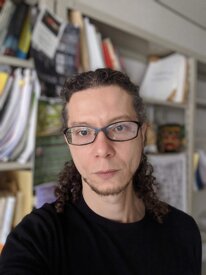
I am an associate professor of anthropology and religious studies at Ritsumeikan University (Kyoto, Japan). My main research area is contemporary Japan, but I carried out ethnographic research also in Italy and Austria. My fields of inquiry include experiences with spirits and social suffering, especially in relation to the perception of space and place (particularly places related to death and the afterlife, as well as haunted places), rumors and discrimination, construction of social memory and “tradition”, tourism and commodification, spirit/demonic possession, exorcism and religious/spiritual healing. From a theoretical perspective, I focus on the anthropology of the body, the perception of the environment, affect and emotions.
I published extensively on these topics in English and Japanese, I am the author of Going to Hell in Contemporary Japan: Feeling Landscapes of the Afterlife, Othering, Memory and Materiality (Routledge, forthcoming 2021), and editor of several books and special issues of academic journals.
Research interests: Hauntings, Spirit Possession, Exorcism, Affect, Bodily Perceptions
Current project: A comparative research on experiences of pathogenic spirit/demonic possession and exorcism in contemporary Japan and Italy.
Contact: deantoni(at)fc.ritsumei.ac.jp
Website:
https://ritsumei.academia.edu/AndreaDeAntoni
Andrea De Antoni
Ritsumeikan University, Graduate School of International Relations, Kyoto, Japan
Social Anthropologist
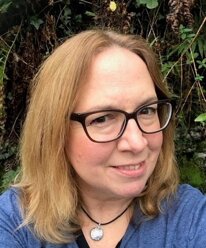
Dr Wendy Dossett is Associate Professor of Religious Studies at the University of Chester. Her main areas of research are in 1) the discourses of spirituality and higher power in Twelve Step Fellowships such as Alcoholics Anonymous and Narcotics Anonymous and 2) Buddhist approaches to addiction recovery. She is interested in how these discourses frame agency and choice, and how they operate in secular or post-secular contexts. She works collaboratively with people with lived experience of substance issues and recovery.
She is Director of Research for Chester Studies of Addiction, Recovery and Spirituality Group https://csarsg.org.uk/ and Principal Investigator of the Higher Power Project https://csarsg.org.uk/research/the-higher- power-project/
Research interests: the language of spirituality in addiction recovery
Current project: The Higher Power Project. Buddhism and Addiction Recovery
Contact: w.dossett(at)chester.ac.uk
Website: https://www1.chester.ac.uk/departments/theology- and-religious-studies/staff/wendy-dossett
Wendy Dossett
University of Chester, UK
Religious Studies
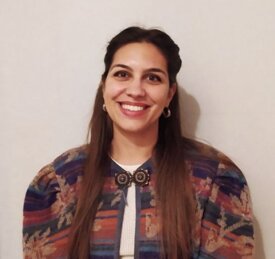
Trained in Anthropology and African Studies at Sapienza University of Rome and SOAS University of London, Cecilia’s research interests lie at the intersection of medical anthropology and the anthropology of religion. Since 2013, she has been carrying out extensive ethnographic fieldwork in southwestern Ghana, working on the articulations of psychiatry and religious/ spiritual healing. Her recently defended PhD dissertation, titled Im | possibilities of Collaboration. Community Psychiatry and Spiritual Healing in Rural Southwestern Ghana looked at ‘collaboration’ experiences between different practitioners and questioned the ways in which this kind of ‘collaboration’ is framed at the national
and international level, what contradictions it entails, what kind of care it contributes to make possible and/or impossible in light of current debates concerning the impact of economic inequalities, the role of psychopharmaceuticals and neurobiological reductionism, the tensions between care
and control in mental health care.
Research interest: mental health; psychiatry; spiritual healing; religion; West Africa.
Current project: Madness, mental illness, and care in West Africa
Contact: cecilia.draicchio(at)uniroma1.it
Website: https://phd.uniroma1.it/web/dottoredettaglio.aspx?s=&i=3547&m=1336479&l=EN&p=&a=
Cecilia Draicchio
Sapienza University of Rome
Anthropology
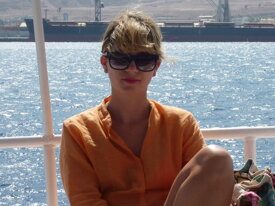
I did my PhD at University College London (2009) on Cuban creole spiritism and the role of the dead in Afro-Cuban religion. For my postdoctoral fellowship I studied cosmological plasticity in Brazilian Umbanda. More recently, I'm looking at paranormal technologies in Chile, as well as ufological endeavors, and understanding this through an anthropology of history approach. I ́ve published many articles, co-edited five books, written two monographs, and I ́m currently on contract to a third.
Research interests: Spiritism; Afro-Cuban religion; Umbanda; paranormal Chile; ufology; personhood; religious materialities; technologies; Anthropology of History; death.
Current project: I am the director of a three year Chilean government funded project, entitled Aspiration and everyday life under neoliberalism: a multi- sited ethnographic study of self-making in Chile (PIA SOC180033).
Contact: gimmefish(at)yahoo.com
Website: https://uc-cl.academia.edu/DianaSanto
Diana Espírito Santo
Pontificia Universidad Católica de Chile
Social Anthropologist
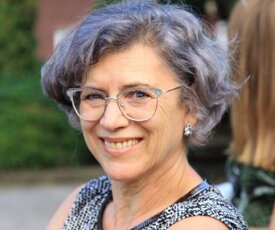
Marta Helena de Freitas is a professor at the Catholic University of Brasilia - UCB, since 1989. She is a psychologist, holds a Master degree in Social Psychology and Personality, PhD in Psychology from the University of Brasilia – UnB, Post-doctoral degree in Psychology of Religion from the University of Kent at Canterbury – UK, in Culture Psychology from the University of Porto – Portugal, in Anthropology of Religion from the Alister Hardy Religious Experience Centre, University of Walles Trinity University Saint David, Lampeter - UK. Her research covers the area of the psychology of religion, thanatology, gerontology, the Rorschach psychodiagnostic, phenomenology, training in psychology and mental health.
She is currently a member of the International Association for the Psychology of Religion—IAPR.
Research interests: Religiosity; Spirituality; Psychology of Religion; Mental Health; Psychodiagnostic.
Research project: Religiosity and spirituality in psychological clinic: health or symptom? Perceptions of psychotherapists.
Contact: mhelenadefreitas(at)gmail.com
Website: https://ucb-br.academia.edu/MartaHelenaFreitas
https://www.researchgate.net/profile/Marta-Freitas- 5
Marta Helena de Freitas
Catholic University of Brasília - UCB, Brazil
Psychology of Religion
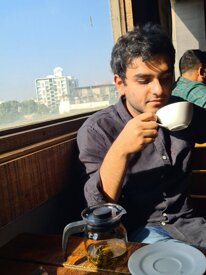
Dhruv Gautam is a PhD candidate at the Research Centre Global Dynamics, Leipzig University, and a member of the International Max Planck Research School - Global Multiplicity. He is interested in the complex ways in which the boundaries between bio-medicine and religious healing are negodated in practice and how they often converge in the lives of individuals experiencing psychic distress. He is particularly interested in the spatial and material mediation of therapeutic practices and how they shape trajectories of sickness and healing.
Research interests: psychiatry,religious healing, healing architecture, materiality, space and place.
Research project: Space, Place, andPsychic Lives: An Ethnography of Sacred and Secular Healing Spaces in North India.
Contact: gautam.dhruv(at)gmail.com
Website: https://uni-leipzig1.academia.edu/dhruvgautam, https://https://uni-leipzig1.academia.edu/dhruvgautamwww.imprs-gm.mpg.de/gautam
Dhruv Gautam
Universität Leipzig, Max Planck Institute for Social Anthropology, Germany
Social Anthropologist

Dr Gould is a cultural anthropologist studying dying and death, Buddhism, technology, and social change. Her research spans new traditions and technologies of death rites, the lifecycle of religious materials, and modern minimalist movements. Dr Gould holds a PhD in Anthropology at the University of Melbourne and a MSc from Oxford University. For her doctoral research, she worked in Japanese Buddhist altar stores, to investigate how cultural traditions around death can themselves ‘die’, be replaced, or transformed. The research will be published in “When Death Falls Apart”, out with University of Chicago Press in 2023.
Research interest: Death and dying; Buddhism; materiality; senses.
Research project: Dying ‘Buddhish’ in Australia:https://psychologicalsciences.unimelb.edu.au/CSC/news/seed- funding-success/dying-buddhish
Contact: Hannah.gould(at)unimelb.edu.au
Website: https://www.hannahgould.com/
Hannah Gould
University of Melbourne
Cultural anthropologist
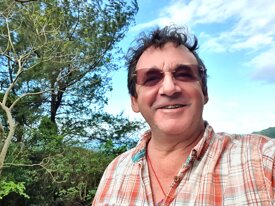
Dr Fabian Graham joined the Asia Research Institute at the National University of Singapore in December 2018. He holds a PhD in Social Anthropology, and two master’s degrees, one in ‘Taiwan Studies’ and the second in ‘Social Anthropological Analysis’. Previously a research fellow at the Max Planck Institute for the Study of Religious and Ethnic Diversity in Germany, based on research in Singapore, Malaysia and Taiwan, his first monograph, Voices from the Underworld: Hell deity worship in contemporary Singapore and Malaysia has recently been published.
Working closely with lingji masters and tang-ki spirit mediums, and adopting a participatory approach to fieldwork where possible, his research interests include the anthropology of Chinese religion; spirit possession; temple ritual and material culture; the invention, inversion and reinterpretation of tradition; visual anthropology; and new ethnographic, narrational and analytical approaches to the study of religious phenomena.
Research interests: Chinese religion, spirit possession, ritual culture, healing rituals, afterlife research.
Current project: Lingji in Taiwan / Nine Emperor God festivals in Southeast Asia
Contact: arifcg(at)nus.edu.sg
Website: https://nus.academia.edu/FabianGraham
Fabian Graham
National University of Singapore
Social Anthropologist
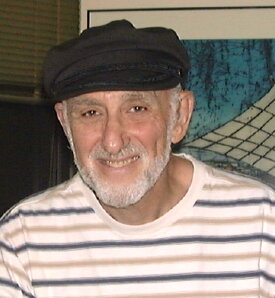
Professor Emeritus of Anthropology. I have conducted research on a variety of topics in Brazil, Portugal and the West Indies over a period of almost 60 years and have published extensively on my research including making several video documentaries. I have been studying the relationship between religious beliefs and practices and healing for more than 4 decades. I also have participated in several applied projects the latest of which is on food production.
Author of Spirits With Scalpels: The CulturalBiology of Spirit Healing in Brazil (2008)
Research interests: religious practices and healing
Contact: sidneygreenfield(at)gmail.com Website: https://independent.academia.edu/GreenfieldSidney
Sidney M. Greenfield
University of Wisconsin-Milwaukee
Anthropologist
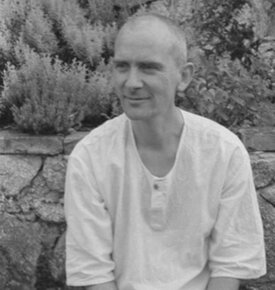
Since my PhD research (2005), my research focuses on how religion is learnt, exploring, from an ethnographic perspective, the mutual influence between cognitive, sensory, emotional and social dimensions of religious learning. I am currently developing a new research in medical anthropology, working with patients suffering from a skin disease called psoriasis. I am interested in the first place in patient's experiential knowledge of illness. Through ethnographic methods, my aim is to show how psoriasis changes the way these persons relate to themselves (body, mind, emotions) and to others in their daily lives, as well as how, through their therapeutic journey, their learn to develop coping strategies despite chronic symptoms.
Research interests: anthropology of health, anthropology of emotions, anthropology of religion, ritual, learning, emotion, health, chronic disease.
Current project: Experiential Knowledge of persons with psoriasis in France and Belgium; learning emotions in the Xangô Cult (Brazil).
Contact: arnaud.halloy(at)univ-cotedazur.fr
Website:https://www.researchgate.net/profile/Arnaud-Halloy;
http://arnaudhalloy.blogspot.com
Arnaud Halloy
Côte d’Azur University, France
Anthropologist
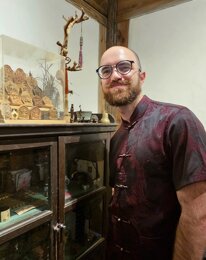
Luis Fernando Bernardi Junqueira is a D. Kim Foundation & Leverhulme Trust Research Fellow at the Department of History and Philosophy of Science, University of Cambridge, and a Research Fellow at Clare Hall, Cambridge. He specialises in the global history of health, science and religion in 19th- and 20th-century China, with extended interests in the histories of mental health and alternative medicines in modern East Asia and South America. His first edited volume, Therapy, Spirituality and East Asian Imaginaries (Amsterdam University Press, 2025), examines how, since the 1960s, communities worldwide have reimagined the therapeutic and spiritual cultures of China, Japan and Korea to defy biomedical views of health, healing and illness. He is currently revising his first monograph,
The Science of the Spirit: Psychical Research, Medicine and the Occult in Chinese Modernity (under review with Cambridge University Press), which explores the Chinese enthusiasm with mental powers during the first half of the 20th century.
Research interests: East Asian and South American history; mental and spiritual health; psychology and the paranormal; alternative therapies; transnational studies.
Current project: 1) The Science of the Spirit: Psychical Research, Medicine and the Occult in Chinese Modernity
2) Healing through the Mind: The Rise of Mind-Cure Movements in Modern East Asia
Contact:lj444(AT)cam.ac.uk
Website: https://luisfbj.com/https://www.hps.cam.ac.uk/staff/dr-luis-fernando-bernardi-junqueira
Luis Fernando Bernardi Junqueira
University of Cambridge, UK
Historian of Health, Science and Religion
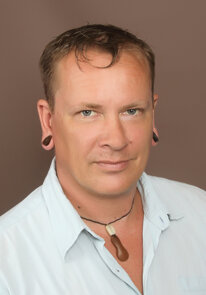
Helmar Kurz studied Ethnology, Religious Sciences, and Archaeology at the University of Muenster/Germany from 2003-2009. Since 2011, he has been lecturer and researcher at the Department of Social & Cultural Anthropology in Muenster, focusing the field of Trans/Cultural Psychiatry at the intersection of Sensory, Religious & Medical Anthropology. From 2015-2018, he participated in the DFG-funded project “Diversification of Mental Health – Therapeutic Spaces of Brazilian Spiritism” and is currently preparing a related PhD-thesis. He engages in the editorial board of CURARE – Journal of Medical Anthropology and has edited a special volume on the “Aesthetics of Healing: Working with the Senses in Therapeutic Contexts” (Curare 42, 3+4).
He also coordinates the master program “Visual Anthropology, Media & Documentary Practices” at the University of Muenster.
Research interests: Medical & Religious Anthropology, Trans/Cultural Psychiatry, Sensory Ethnography & Anthropology of the Senses, (Mental) Health-Care, Environment, Translocal Relations, Spiritism, Afro-Brazilian Practice & Culture
Current project: International, Interdisciplinary & Intersectional Conference on “Radical Health: Doing Medicine, Health Care & Anthropology of the Good” – June 2021 (http://agem.de/events/agem-annual-conference-33-radical-health/?lang=en
Contact: helmar.kurz(at)uni-muenster.de
Website: https://www.uni- muenster.de/Ethnologie/en/personal/wissenschaftlichemitarbeiter_innen/helmarkurz.h tml
Helmar Kurz
University of Muenster, Germany
Social Anthropologists
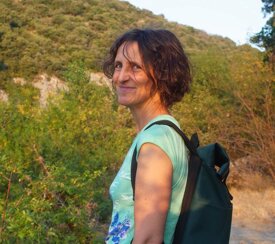
Sara Le Menestrel is a cultural anthropologist and a senior research fellow at the National Center for Scientific Research (CNRS). She has dedicated most of her work in the anthropology of music, and published Negotiating Difference: Categories, Stereotypes and Identifications in French Louisiana Music (U. Press of Mississippi, 2014). She coordinated the nationally-funded project "Musiques, danses et mondialisation : circulations, mutations, pouvoir,"resulting in a team-authored book, Lives in Music. Mobility and Change in a Global Context (Routledge, 2019). In 2005, she extended her research interests to the anthropology of disaster through post-Katrina Louisiana. Since 2015, she has been working on the use of mindfulness meditation in healthcare and the overlap between scientific and religious rationalities.
She’s particularly interested in exploring the variety of ethnographic writings, especially through sound documentaries.
Research interests: Contemporary spiritual practices; mental health; disasters; sound ethnography; musical practices; North America, France.
Current project: Mindfulness meditation in healthcare: (France and the US): uses in mental health, politics of certification, contemplative sciences, representations of the self, sensorial sociality, mechanisms of circulation; sound ethnography;
Contact: lemenest(at)ehess.fr
Website: http://cena.ehess.fr/index.php?297
http://musmond.hypotheses.org/
http://slm.hypotheses.org
Sara Le Menestrel
CNRS (National Center for Scientific Research), France
Cultural Anthropologist

She did field work in France, Italy, Mexico and Switzerland.
Research interests: Anthropology of religion, Anthropology of Health, Contemporay spiritualities, Health, Neo-shamanism, Spiritualities and Religions in hospitals.
Current project: “Le Religioni n ospedale. Integrare spiritualità e medicina nelle pratiche di cura” Università degli Studi di Torino.
Contact:
lombardi.denise(at)gmail.com
Website: https://www.researchgate.net/profile/Denise-Lombardi-3
https://unito.academia.edu/DeniseLombardi
Denise Lombardi
University of Turin, Italy Anthropologist
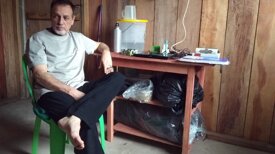
Santiago López-Pavillard is a cultural anthropologist, holding a doctorate from the Complutense University of Madrid with the thesis Life as a healing process: shamanic practices of the Upper Amazon related to ayahuasca in Spain, of which a version titled Shamans, ayahuasca and healing has been published (Madrid: High Council for Scientific Research, 2018). He is a founding member of the Anthropology of Religion and Spirituality Thematic Group (ARESIMA) at the Madrid Institute of Anthropology and president of the Eleusis Association for the study of states of consciousness.
He has carried out fieldwork in Spain, Peru, Ecuador and Brazil.
Research interests: Shamanhood, Animistic Turn, Radical Participation, Vegetalism, Amazonian Shamanism
Current project: The Animistic Turn and the relationship between Health and Spirituality
Contact: santiago(at)mercurialis.com
Website: https://academia.asociacioneleusis.es/https://cursos.asociacioneleusis.es/
https://independentresearcher.academia.edu/SantiagoL%C3%B3pezPavillard
Santiago López-Pavillard
Eleusis Association for the Study of States of Consciousness, Spain
Cultural Anthropologist

I am an anthropologist researching environmental movements and regenerative practices that seek to heal both people and the Planet Earth. My current project explores what healing means in contemporary societies, with a focus on how various social, ecological, and spiritual practices (e.g., craft, mindfulness, retreats) facilitate healing across diverse contexts and settings, mostly in China. This work aims to contribute to the anthropology of restoration, repair, and resilience, as well as to the broader field of global mental health, by illuminating alternatives to biomedical and psychiatric approaches to healing.
In doing so, it seeks to cultivate more inclusive and sustainable pathways to holistic wellbeing.
Research interests: Environmentalism; Holistic Wellbeing; Spirituality; Regenerative Practices; Activism
Contact: Ieng.t.lou(AT)durham.ac.uk
Website: https://www.durham.ac.uk/staff/ieng-t-lou/https://www.linkedin.com/in/lorettalou/
Loretta Lou
Durham University, UK
Medical Anthropologist
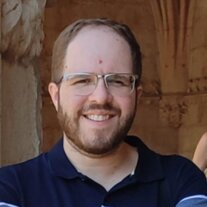
Everton de Oliveira Maraldi is the current president of the Parapsychological Association (USA). He is a professor in the Postgraduate Program on Medical Sciences at the D’Or Institute for Research and Education (Pioneer Science Initiative, Brazil) and a research associate at the Institute of Psychiatry, Faculty of Medicine, University of São Paulo, Brazil. He holds a PhD in Social Psychology from the University of São Paulo and was a research fellow at both the University of Oxford and Coventry University (UK). His research focuses on the psychology of anomalous exper
iences, altered states of consciousness, and the impact of religion and spirituality on mental health and well-being. His contributions have been recognized in the Psi Encyclopedia of the
Society for Psychical Research: https://psi- encyclopedia.spr.ac.uk/articles/everton-maraldi
Research interests: Spirituality, Religion and Health; Psychology of Anomalous Experiences and Non-Ordinary States of Consciousness; Mediumship/possession experiences; Dissociative experiences; Differential diagnosis between healthy and pathological anomalous experiences; Clinical approaches to anomalous experiences.
Current project: Phenomenology and neuropsychiatry of mediumship experiences in Brazil.
Contact: everton.nom(at)gmail.com
Website: https://www.researchgate.net/profile/Everton- Maraldi?ev=prf_overview
Everton de Oliveira Maraldi
D’Or Institute for Research and Education
Institute of Psychiatry, Faculty of Medicine, University of São Paulo, Brazil
Psychologist
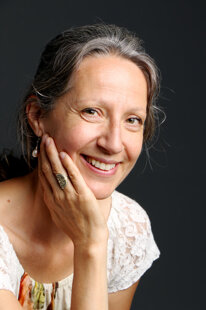
I am an anthropologist and full professor at the Institute of Religious Studies of Université of Montreal. I currently work on new spiritualities and on the healing dimension of holistic practices that I address through ethnographic studies anthropological and experiential approaches. My research aims at contributing to the development of the field of health humanities. I have published and edited numerous books and special reviews on religious conversions as well as the intersection between spiritualities and healing (see New spiritualities and the cultures of well-being, Springer, 2022).
Research interests: Anthropology of healing, religion, spiritualities, neoshamanism, animal, conversions, mind-body practices, holistic practices.
Current project: I am currently conducting an ethnographic comparison between neoshamanic healing practices and energy-based mind-body groups (5 rhythms, core energetics). On both fieldworks, I explore the definitions of health and of human beings as well as the relationships between humans and non human entities (animal spirits). As I examine how the legal measures that frame holistic practices shape the development of this field in various countries, I also aim to engage a conversation between conventional medical system and holistic milieux.
Contact:
Geraldine.mossiere(at)umontreal.ca
Website: https://umontreal.academia.edu/GeraldineMossiere
Géraldine Mossière
Université de Montréal, Canada
Anthropologist of Religion
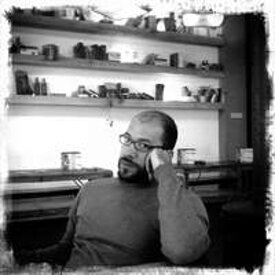
PhD in Social Anthropology (University of Edinburgh, 2011). Currently a senior researcher at CRIA-Universidade Nova de Lisboa, Portugal. Has published extensively, in numerous journals and edited volumes, on Afro-Cuban religiosity and lately on contemporary spirituality in Spain. Co-editor, with Diana Espírito Santo, of the edited volume Articulate Necrographies: Comparative Perspectives on the Voices and Silences of the Dead (2019, Berghahn) and co-author, with Eugenia Roussou, of the article “We Have Always Been Transreligious: An Introduction to Transreligiosity” (2022, Social Compass).
Research interests: Afro-Cuban divination and religiosity in Cuba and Spain; ontemporary spirituality and alternative
healing in the South of Europe; divination; religion; secularization; therapeutic practices
Current project:
EMERGIA research grant, ref. no.: EMC21-00043, Conserjeria de Universidades, Investigacion e Innovacion de la Junta de Andalucia
Contact: anasta4(at)hotmail.com
Website: https://us.academia.edu/AnastasiosPanagiotopoulos
Anastasios Panagiotopoulos
Department of Social Anthropology
University of Seville, Spain
Social Anthropologist
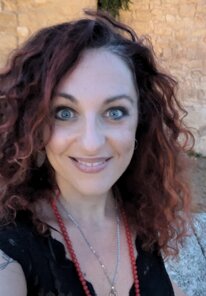
I am an anthropologist of religion and magic and a scholar of Contemporary Paganisms and “alternative spiritualities.” My ethnographic fieldworks are in Southern Italy (Salento) and Arizona. My work is firmly grounded in ethnographic and auto-ethnographic practices, and my main focuses of interest are magic and religion, politics, gender, and the environment. I also write on gender violence, olive trees, and conspiracy theories and I am the host of an online series called Gnoseologies, organized within the Transcendence and Transformation initiative at the CSWR (Harvard University). I am the author of The Spider Dance (Equinox Publishing), on the healing potential of alternative historicities, and I am currently working on a book for Routledge titled “Lived Conspirituality.”
Research interests: Contemporary Paganisms, alternative spiritualities, women’s studies, sensory ethnography, humanistic anthropology
Current project: alternative spiritualities (including UFO religions) and well-being in Arizona
Contact: gparmigiani(at)hds.harvard.edu
Website: Gnoseologies | Center for the Study of World Religions (harvard.edu)
Giovanna Parmigiani
Harvard Divinity School, Center for the Study of World Religions, Harvard University, US
Anthropologist of Religion
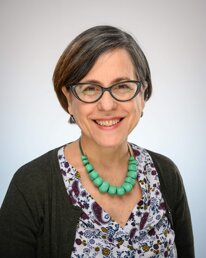
Cristina Rocha is Professor of anthropology and the Director of the Religion and Society Research Cluster, Western Sydney University, Australia. She is presently a fellow at the Paris Institute for Advanced Study (2021-2022). She is a former President of the Australian Association for the Study of Religion (2018-2019) and co-edits the Journal of Global Buddhism and the Religion in the Americas Brill series. Her research focuses on the intersections of globalisation, mobility and religion. Her publications include, among other books: John of God: The Globalization of Brazilian Faith Healing (Oxford University Press, 2017), Honourable Mention 2019 Geertz Prize, Society for the Anthropology of Religion (AAA); The Diaspora of Brazilian Religions (with M. Vásquez, Brill, 2013); Buddhism in Australia (with M. Barker, Routledge, 2010); Zen in Brazil: The Quest for Cosmopolitan Modernity (Hawaii University Press, 2006).
Research interests: Healing, transnationalism, mobility, spirituality
Current projects: ‘(Con)spirituality, Science and the COVID-19 pandemic in Australia The African Diaspora (with A. Halafoff, A. Singleton, E. Weng and A. Roginski, Deakin U). Funded by the International Research Network for the Study of Science and Belief in Society (INSBS), Birmingham University.
‘The African Diaspora and Pentecostalism in Australia: New Perspectives on Materiality, Media and Religion’ (with R. Vokes, UWA, and K. Openshaw, WSU). Funded by the Australian Research Council.
Contact: c.rocha(at)westernsydney.edu.au
Website: https://www.cristinarocha.com.au/
https://www.westernsydney.edu.au/religion_and_society/people/researchers/dr_cristina_rocha
https://westernsydney.academia.edu/CristinaRocha
Cristina Rocha
Western Sidney University, Australia
Anthropologist

Raquel Romberg is a sociocultural anthropologist and folklorist. She focuses on Puerto Rican brujería, an Afro-Latin and Spiritist practice that includes divination, possession, healing rituals, and the making of magic works. Raquel integrates archival and intensive ethnographic investigations leading to a combined ethnohistorical and ethnographic understanding of the changing role of brujos (witch healers) in colonial and postcolonial periods. She demonstrates their entrepreneurial role as intermediaries between the welfare state and the individual, confronting modern consumerist and neoliberal conflicts. Raquel’s extensive uncensored audio and visual documentation of brujería rituals has been published in Witchcraft and Welfare: Spiritual Capital and the Business of Magic in Modern Puerto Rico (2003), Healing Dramas: Divination and Magic in Puerto Rico (2009),
and several articles on the sensuous and poetic aspects of ritual healing and altar-making, on the phenomenology and discourse of spirit possession, and on colonial and postcolonial histories of religious creolization.
Research interests: healing, magic, senses, performance, visual anthropology
Current project: “‘Look How Beautiful this Magic Work Is!’ On the Esthetic, Performative and Affective Magic Efficacy of Shimmer
Contact: raquel.romberg(at)fau.de
Website:
CAS-E page
publications
Academia.edu page
Raquel Romberg
CAS-E Center for Advanced Studies, Erlangen, Germany
Sociocultural anthropologist

Eugenia Roussou (PhD in Social Anthropology, UCL, University of London) is a Senior Researcher at the Centro em Rede de Investigação em Antropologia (CRIA), ISCTE-IUL, Lisbon, Portugal. She was previously a post-doctoral researcher at CRIA, with two projects funded by the Fundação para a Ciência e Tecnologia (FCT), and a visiting researcher at Panteion University of Athens, Greece. She is the co-Reviews Editor of Religion and Society, the Treasurer of ISARS (International Society for Academic Research on Shamanism) and the co-coordinator of NAR-CRIA (Network for the Anthropology of Religion). She is the author of the book Orthodox Christianity, New Age Spirituality and Vernacular Religion: The Evil Eye in Greece (2021, Bloomsbury), and the co-editor of Expressions of Religion: Ethnography, Performance and the Senses (2019, Lit-Verlag).
She has conducted extensive ethnographic fieldwork in Greece and Portugal and has published on the relationship among religion, spirituality and healing in southern Europe.
Research interests: holistic healing; New Age and/or alternative spirituality; Complementary and Alternative Medicine (CAM); senses and emotions; vernacular, lived and transnational religiosity.
Current project: ‘Transnational Religiosity in southern Europe: an anthropological exploration of spiritual fluidity, creativity and transformation in a changing world’.
ReSpell. Religion, Spirituality and Wellbeing in Southern Europe
Contact: jennyroussou(at)gmail.com
Website:
https://eugeniaroussou.wixsite.com/anthrospirit https://iscte-iul.academia.edu/EugeniaRoussou
Eugenia Roussou
Centro em Rede de Investigação em Antropologia (CRIA), ISCTE-IUL,
Portugal
Social Anthropologist
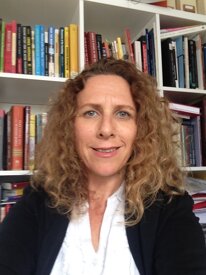
Liora Sarfati is an anthropologist and folklorist whose specialism spans religion, society, culture, and the media. She holds a Ph.D. from Indiana University, and is currently a senior lecturer (associate professor) at the Department of East Asian studies of Tel Aviv University. Her research explores the production of vernacular rituals in contemporary South Korea, and the recent protests in downtown Seoul. Sarfati’s research methods include ethnography in urban settings, media analysis, folklore research, and digital humanities. Her recent article about healing in Korean shamanism was published in The Drama Review, Other articles appeared in Journal of American Folklore, Journal of Korean Studies,
Asian Studies Review, Journal of Folklore Research, Urbanities, and as book chapters. Her monograph, Contemporary Korean Shamanism: From Ritual to Digital was published in 2021 with Indiana University.
Research interests: Shamanism, hypermodernity, healing, symbols, ritual.
Current project: Healing through performance in Korean shamanism.
Contact: lsarfati(at)tauex.tau.ac.il
Website: http://www.liorasarfati.com
Liora Sarfati
Tel-Aviv University, Israel Anthropologist
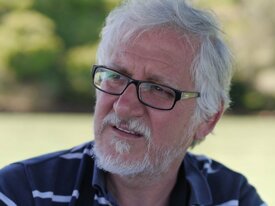
PhD in Anthropology. Full Professor at University of Messina. Member of the board of the Italian Society of Medical Anthropology and member of the editorial board of the journal AM. Rivista della Società italiana di antropologia medica and L’Uomo. Visiting professorships: Keio University of Tokyo (Japan); Federal University of Stavropol (Russia); Mekelle University (Ethiopia). Fieldwork in Ethiopia, Ghana, and Italy.
Research interests: Medical Anthropology, Ethnopsychiatry, Religious Anthropology, Migrations, History of Anthropology, African studies.
Current project: Pentecostalism in West Africa
Contact: giuseppe.schirripa(at)unime.it
Website:
https://www.researchgate.net/profile/Pino_Schirripa
Pino Schirripa
University of Messina, Italy
Anthropologist
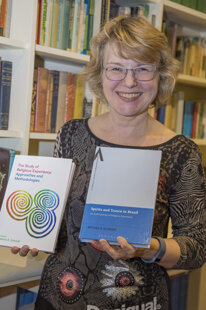
Prof. Dr. Bettina E. Schmidt, DPhil (habil.), PhD, MA, Professor in study of religions and anthropology of religion at the University of Wales Trinity Saint David, UK. Her main areas of research interests are Latin American and Caribbean religions, identity, and wellbeing. Her academic interests include religious experience, anthropology of religion, diaspora, and medical anthropology. Among her most important recent publications are Spirit and Trance in Brazil: An Anthropology of Religious Experiences (2016, Bloomsbury),Caribbean Diaspora in the USA: Diversity of Caribbean Religions in New York City (2008, Ashgate), Handbook of Contemporary Brazilian Religions (co-edited, 2016, Brill) and Spirituality and Wellbeing: Interdisciplinary approaches to the study of religious experience and health (co-edited, 2020, Equinox).
Research interests: Spirituality and wellbeing, African derived religions, spiritism, Brazil, mediumistic religions
Current project: Spirituality and Wellbeing
Contact: b.schmidt(at)uwtsd.ac.uk
Website: https://www.uwtsd.ac.uk/staff/bettina-schmidt/
Bettina E. Schmidt
University of Wales Trinity Saint David UK
Anthropology of Religion
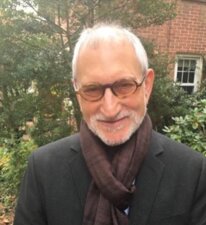
Paul Stoller is a Permanent Fellow at the Center for Advanced Studies/FAU-Erlangen and Professor of Anthropology at West Chester University. In his more than 35 years of anthropological research and writing, Stoller has conducted ethnographic research Songhay religion, magic, sorcery and spirit possession practices in Niger and the life of West African street traders in New York City. Stoller’s work encompasses the study of economic exchange, religion, ethnographic film, and the human quest for well being in turbulent times. In his most recent work he investigates how indigenous wisdom can not only enhance social well-being but also help to heal a troubled world.
Research interests: Ethnography, West Africa, Well Being, Wisdom, Healing
Current project: Healing Stories (new book project)
Contact: pstoller(at)wcupa.edu
Website:
https://cas-e.de/teammembers/stoller-paul/
https:/psychologytoday.com
https:/www.wcupa.edu
Paul Stoller
Center for Advanced Study FAU-Erlangen Germany, and West Chester University USA
Cultural Anthropologist
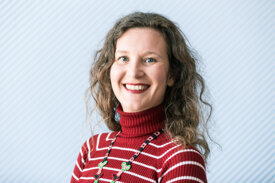
Piera Talin is an Italian anthropologist, studying ayahuasca use in Brazil and Europe, principally Santo Daime, hybrid ritual and therapeutic practices, and addiction. Her joint PhD between the University of Amsterdam (AISSR) and EHESS (Paris) focused on the circulation and reinventions of ayahuasca ritual healing in urban contexts between Brazil and Europe, as part of the ERC Starting Grant Program Healing Encounters: reinventing an indigenous medicine in the clinic and beyond, headed by Emilia Sanabria at Centre for Research on medicine, science, health, mental health and society (CNRS). She trained in Italy with Master Degree in Cultural Anthropology, Ethnology and Ethnolinguistic at Cà Foscari University in Venice in collaboration with the Federal University of Santa Catarina,
Florianópolis, Brazil, with dissertation on ayahuasca religious communities and Bachelor degree in Theories and Practices of Anthropology at La Sapienza University of Rome with dissertation on medical anthropology and ethno-psychiatry.
Research interests: Ritual, healing, ayahuasca, Brazil, plants, Medical Anthropology, Anthropology of Religion
Current project: Contemporary transformations of ayahuasca ritual healing in Brazil and Europe
Contact:
pieratalin(at)gmail.com
Website: https://uva.academia.edu/PieraTalin
Piera Talin
Cermes3, CNRS, Paris
Social and Cultural Anthropologist
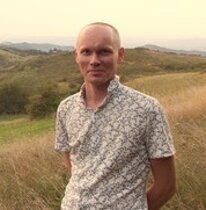
My approach has been to find the largest and most relevant societal problems at each time and to find innovative solutions to them. These have included opioid addiction, violence, the COVID-19 pandemic, and mental disorders such as treatment-resistant depression, early and long-term emotional traumatization (C-PTSD), psychoses, bipolar disorder, sexual abuse, and domestic violence. In addition, I have worked with research on emotions/affects/artificial intelligence, algorithm research/computer science, and the arts.
Research interest: C-PTSD, psychosis
Contact: mika.turkia(at)alumni.helsinki.fi
Website: https://psychedelictherapy.fi/
https://www.researchgate.net/profile/Mika-Turkia
Mika Turkia
Independent researcher
Psychedelic therapies
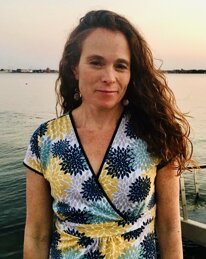
Dr. Tamara Turner works at the intersection of psychological anthropology, musical and performance practice, and affect studies. She specializes in North African Sufism, anthropology of religion & medicine, and the links between cultural notions of affect, consciousness, and mental-emotional health particularly in Algeria and Morocco. Her doctoral thesis was the first ethnomusicological research to thoroughly document the musical repertoire, practice, and history of Algerian diwan, a nocturnal trance ritual of the Bilaliyya Sufi Order that emerged out of the trans-Saharan slave trade. As a musician as well as a scholar, she studied with ritual musicians and experts, attending and documenting diwan rituals across Algeria
from the Mediterranean coast to the Sahara Desert. In 2017, her doctoral thesis won an Elsevier Outstanding Thesis prize.
Research interests: Psychological anthropology, music studies, North African Studies, trance Sufism consciousness mental-emotional health.
Current project: book manuscript on Algerian Diwan of Sidi Bilal, a music and trance practice of the Bilaliyya Sufi order
Contact: turner(at)mpib-berlin.mpg.de ; tamaradeeturner(at)gmail.com
Website: https://mpib-berlin-mpg.academia.edu/TamaraTurner
Tamara Dee Turner
Max Plank Institute for Human Development, Germany
Psychological Anthropologist
© HEAL Network for the Ethnography of Healing
